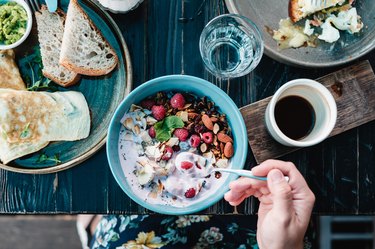
A healthy body weight improves immunity, sports performance, healing from surgery or trauma and self-esteem. You hear a lot about losing weight to achieve it, but some people actually need to put on some pounds. Frequent snacking and nutrient-rich, high-calorie meals help put on the pounds.
A diet of junk-food snacks may cause weight gain, but this food doesn't provide nutrients to improve your health or well-being. And, even if you're underweight, you can still develop conditions related to a poor diet — including heart disease and Type 2 diabetes.
Video of the Day
Video of the Day
Read more: Weight Gain Meal Plan for Women
Try These Weight-Gain Strategies
Weight gain requires you eat more calories than you burn. A 250- to 500-calorie surplus results in a healthy 1/2- to 1-pound gain per week, as explained by the University of Colorado. Gaining weight too fast means you'll pile on fat, rather than mostly muscle.
When planning weight-gain meals, opt for foods that have a high calorie and nutrient density. Dried fruits, cheese, nuts, wheat germ, avocados, olive oil and milk add calories and provide healthy versions of carbohydrates, protein and fats.
Aim for three solid meals and two or three snacks every day. If you have a tendency to fill up fast, try five or six smaller meals rather than three large ones, suggests the Mayo Clinic. Carry snacks with you so you don't miss a meal. Increase portion sizes at meals and drink calories from milk, 100 percent juice and smoothies.
Resistance training two or three times per week helps you build lean muscle instead of just fat as you add weight to your frame, as recommended by the University of Colorado. Do comprehensive workouts that target every major muscle group using weights that challenge you through the end of your eight-repetition set.
High-Calorie Breakfast Meals
Aim for larger portions than you normally eat and choose calorie-dense foods instead of flaked cereal and plain toast or fruit for your high-calorie breakfast. For example, have 1 cup of granola cereal with 1 cup of whole milk and 1 cup of sliced banana for 803 calories, according to the USDA. Top with an ounce of walnuts to add another 190 calories.
Alternatively, serve yourself two large scrambled eggs topped with 1 ounce of cheddar cheese for 280 calories. Drink a glass of whole milk on the side to add 149 calories along with a cinnamon-raisin English muffin topped with 2 tablespoons of peanut butter for another 309 calories, bringing your breakfast total to 738 calories.
Consider These Meal Ideas
Make high-calorie recipes: Opt for dense, whole-grain breads, chunky or creamy soups, whole grains, generous portions of protein and starchy vegetables. Go for 1.5 cups of whole-wheat spaghetti with 4 ounces of roasted chicken breast for 513 calories or 3/4 cup sweet potato with 6 ounces of skirt steak for 574 calories. A vegetarian high-calorie dinner might involve mixing a cup of black beans with 1 cup of brown rice for 560 calories.
Add 1 cup of mashed avocado to either meal for 368 extra calories or some cheddar cheese for 120 calories per ounce. Increase the meals' calories even more by drinking milk or juice alongside, having yogurt with fresh fruit for dessert or grabbing a handful of nuts as a quick finish.
Read more: What Foods to Eat to Gain Weight Quickly?
Sneak in Some Snacks
Snacks help you sneak in extra calories during the day, especially if you find large meals overwhelming to your appetite. Carry a cup of trail mix with you to munch throughout the day for 640 calories; alternatively, a cup of raisins provides 480 calories. Have a peanut butter sandwich on whole-wheat bread before bed for a quick 352 calories. Whole-grain crackers with cheese and even nutritional-supplement shakes will do in a pinch.
Other ways to boost calories at meals and snack time is to add dry milk powder to casseroles, a glass of milk or smoothies. It provides 211 calories and 11 grams of protein per 1/3 cup of the powder. Unsaturated fats are nutrient-dense sources of calories, too. Try olive oil mixed into pasta, ground flax seeds sprinkled over breakfast cereal or sunflower seeds sprinkled over a salad.
- University of Colorado: "Eating Strategies to Gain Weight"
- USDA FoodData Central: "Chicken, Breast, Roasted, Broiled, or Baked, Skin Not Eaten"
- USDA FoodData Central: "Whole Wheat Spaghetti"
- USDA FoodData Central: "Sweet Potato"
- USDA FoodData Central: "Beef, Plate, Inside Skirt Steak, Separable Lean and Fat, Trimmed to 0" Fat, All Grades, Cooked, Broiled"
- USDA FoodData Central: "Black Beans"
- USDA FoodData Central: "Brown Rice"
- USDA FoodData Central: "Avocado, Raw"
- USDA FoodData Central: "Cheddar Cheese"
- USDA FoodData Central: "Granola"
- USDA FoodData Central: "Whole Milk"
- USDA FoodData Central: "Banana, Raw"
- USDA FoodData Central: "Walnuts"
- USDA FoodData Central: "Eggs"
- USDA FoodData Central: "Muffin, English, With Raisins"
- USDA FoodData Central: "Peanut Butter"
- USDA FoodData Central: "Trail Mix"
- USDA FoodData Central: "Raisins"
- USDA FoodData Central: "Bread, Whole Wheat"
- USDA FoodData Central: "Milk, Dry, Not Reconstituted, Whole"
- Mayo Clinic: "What's a Good Way to Gain Weight If You're Underweight?"